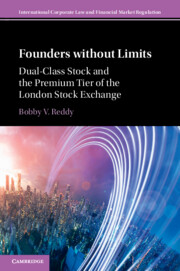Book contents
- Founders without Limits
- Cambridge University Press
- Founders without Limits
- Copyright page
- Contents
- Figures
- Tables
- Preface
- Acknowledgements
- Table of Cases
- Table of Legislation and Regulation
- Abbreviations
- Introduction
- Part I Putting Dual-Class Stock into Context
- Part II Evaluating Dual-Class Stock
- 5 From Controlling Shareholders to Dual-Class Stock
- 6 Theoretical Benefits and Detriments of Dual-Class Stock
- 7 The Empirical Evidence on Dual-Class Stock
- Part III Formulating a Policy on Dual-Class Stock
- Appendix Comparison of Inferior-Voting Shareholder Protections on Major Dual-Class Stock Exchanges
- Index
7 - The Empirical Evidence on Dual-Class Stock
from Part II - Evaluating Dual-Class Stock
Published online by Cambridge University Press: 29 October 2021
- Founders without Limits
- Cambridge University Press
- Founders without Limits
- Copyright page
- Contents
- Figures
- Tables
- Preface
- Acknowledgements
- Table of Cases
- Table of Legislation and Regulation
- Abbreviations
- Introduction
- Part I Putting Dual-Class Stock into Context
- Part II Evaluating Dual-Class Stock
- 5 From Controlling Shareholders to Dual-Class Stock
- 6 Theoretical Benefits and Detriments of Dual-Class Stock
- 7 The Empirical Evidence on Dual-Class Stock
- Part III Formulating a Policy on Dual-Class Stock
- Appendix Comparison of Inferior-Voting Shareholder Protections on Major Dual-Class Stock Exchanges
- Index
Summary
Although a great deal of uncertainty has surrounded the interpretation of dual-class stock empirical evidence, if studies that pertain to different types of firm performance are collated, emerging trends are evident.Event-based studies are the least useful, since the effect of dual-class stock creation or dissolution is often masked by contemporaneous events.More helpful are firm value studies, using Tobin’s Q or derivatives thereof, which generally show negative correlation between dual-class stock and firm value.However, buy-and-hold return studies show that investors earn as good (if not better) returns investing in notional portfolios of dual-class stock than matched one share, one vote firms, and the operating performance of dual-class firms is generally at least as good as matched one share, one vote firms.Although emerging evidence suggests that differences may subsist between different types of firms, with high-growth firms potentially benefiting the most from dual-class stock, overall, investors protect themselves from the perceived risks by pricing them in, and, in fact, discounting is arguably excessive.Rather than prohibiting dual-class stock, the conversation should shift to using public shareholder protections to reduce the cost of capital for such firms, since the evidence does not show that dual-class stock harms public shareholders.
Keywords
- Type
- Chapter
- Information
- Founders without LimitsDual-Class Stock and the Premium Tier of the London Stock Exchange, pp. 249 - 308Publisher: Cambridge University PressPrint publication year: 2021



